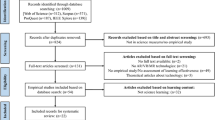Abstract
The global spread of COVID-19 has disrupted education in recent times. Imparting social skills necessary to survive in professional life is becoming increasingly challenging in the post-COVID-19 new normal. The existing online learning platforms which have been primarily developed as a technology for content delivery need to be augmented with additional features required to impart social skills and provide better learning experiences. In this paper, we provide a technical evaluation of two emerging technologies called augmented and virtual reality from the point of view of imparting social skills such as working as a team member, group-based learning, participating in real-life physical events (e.g., seminars and conferences, group discussion), and carrying out physical experiments in the laboratories. This paper describes the approaches to impart social skills through AR and VR based platforms.
Access this chapter
Tax calculation will be finalised at checkout
Purchases are for personal use only
Similar content being viewed by others
References
Akat, M., Karataş, K.: Psychological effects of COVID-19 pandemic on society and its reflections on education 15, 1–13 (2020)
Azuma, R.T.: A survey of augmented reality. Presence: Teleoper. Virtual Environ. 6(4), 355–385 (1997)
Beauchamp, M., Anderson, V.: Social: an integrative framework for the development of social skills. Psychol. Bull. 136, 39–64 (2010)
Bolas, M.T., Fisher, S.S.: Head-coupled remote stereoscopic camera system for telepresence applications. In: Fisher, S.S., Merritt, J.O. (eds.) Stereoscopic Displays and Applications, Volume 1256 of Society of Photo-Optical Instrumentation Engineers (SPIE) Conference Series, pp. 113–123, September 1990
Brooks, F.P.: Walkthrough-a dynamic graphics system for simulating virtual buildings. In: Proceedings of the 1986 Workshop on Interactive 3D Graphics, I3D 1986, New York, NY, USA, pp. 9–21. Association for Computing Machinery (1987)
Bryson, S., Levit, C.: The virtual wind tunnel. IEEE Comput. Graph. Appl. 12(4), 25–34 (1992)
Caudell, T.P.: Introduction to augmented and virtual reality. In: Das, H. (ed.) Telemanipulator and Telepresence Technologies, vol. 2351, pp. 272–281. International Society for Optics and Photonics, SPIE, Bellingham (1995)
Chan, S., Cai, Y., Lu, A., Tun, N.Z., Huang, L., Chandrasekaran, I.: Virtual reality enhanced pink dolphin game for children with ASD. In: Proceedings of the 3rd Asia-Europe Symposium on Simulation & Serious Gaming, VRCAI 2016, New York, NY, USA, pp. 215–218. Association for Computing Machinery (2016)
Craig, A.B.: Augmented reality applications (chap. 8). In: Craig, A.B. (eds.) Understanding Augmented Reality, pp. 221–254. Morgan Kaufmann, Boston (2013)
Cruz-Neira, C., Sandin, D.J., DeFanti, T.A., Kenyon, R.V., Hart, J.C.: The CAVE: audio visual experience automatic virtual environment. Commun. ACM 35(6), 64–72 (1992)
Herskovitz, J., et al.: Making mobile augmented reality applications accessible. In: The 22nd International ACM SIGACCESS Conference on Computers and Accessibility, ASSETS 2020, New York, NY, USA. Association for Computing Machinery (2020)
Hunter, I.W., et al.: A teleoperated microsurgical robot and associated virtual environment for eye surgery. Presence Teleoper. Virtual Environ. 2(4), 265–280 (1993)
Jurevičienė, M., Kaffemaniene, I., Ruškus, J.: Concept and structural components of social skills. Baltic J. Sport Health Sci. 3, 10 (2018)
Jyoti, V., Lahiri, U.: Virtual reality based joint attention task platform for children with Autism. IEEE Trans. Learn. Technol. 13(1), 198–210 (2020)
Kagan, S., Kagan, S.: Cooperative Learning, vol. 2. Kagan Cooperative Learning, San Juan Capistrano (1994)
Mambo, S.M., Omusilibwa, F.M.: Effects of coronavirus pandemic spread on science, technology, engineering and mathematics education in higher learning institutions. In: 2020 IFEES World Engineering Education Forum - Global Engineering Deans Council (WEEF-GEDC), pp. 1–4 (2020)
Mann, S.: Phenomenal augmented reality: advancing technology for the future of humanity. IEEE Consum. Electron. Mag. 4(4), 92–97 (2015)
Milgram, P., Takemura, H., Utsumi, A., Kishino, F.: Augmented reality: a class of displays on the reality-virtuality continuum. Telemanipulator Telepresence Technol. 2351, 282–292 (1994)
Onyesolu, M.O., et al.: Virtual reality: an emerging computer technology of the 21st century. Electrosc. J. 1(1), 36–40 (2016)
Pellett, K., Zaidi, S.F.M.: A framework for virtual reality training to improve public speaking. In: 25th ACM Symposium on Virtual Reality Software and Technology, VRST 2019, New York, NY, USA. Association for Computing Machinery (2019)
Requena-Carrión, J., Alonso-Atienza, F., Guerrero-Curieses, A., Rodríguez-González, A.B.: A student-centered collaborative learning environment for developing communication skills in engineering education. In: IEEE EDUCON 2010 Conference, pp. 783–786 (2010)
Sievertsen, H.H., Burgess, S.: Schools, skills, and learning: the impact of COVID-19 on education. https://voxeu.org/article/impact-covid-19-education. Accessed 24 December 2020
Slovák, P., Fitzpatrick, G.: Teaching and developing social and emotional skills with technology. ACM Trans. Comput.-Hum. Interact. 22(4), 1–34 (2015)
Vince, J.: Virtual reality techniques in flight simulation. In: Virtual Reality Systems (1993)
Yan, S., Yan, X., Shen, X.: Exploring social interactions for live performance in virtual reality. In: SIGGRAPH Asia 2020 Posters, SA 2020. Association for Computing Machinery (2020)
Zhao, H., Swanson, A.R., Weitlauf, A.S., Warren, Z.E., Sarkar, N.: Hand-in-hand: a communication-enhancement collaborative virtual reality system for promoting social interaction in children with autism spectrum disorders. IEEE Trans. Hum.-Mach. Syst. 48(2), 136–148 (2018)
Author information
Authors and Affiliations
Corresponding authors
Editor information
Editors and Affiliations
Rights and permissions
Copyright information
© 2022 Springer Nature Switzerland AG
About this paper
Cite this paper
Mukkawar, V.V., Netak, L.D. (2022). Technological Evaluation of Virtual and Augmented Reality to Impart Social Skills. In: Kim, JH., Singh, M., Khan, J., Tiwary, U.S., Sur, M., Singh, D. (eds) Intelligent Human Computer Interaction. IHCI 2021. Lecture Notes in Computer Science, vol 13184. Springer, Cham. https://doi.org/10.1007/978-3-030-98404-5_6
Download citation
DOI: https://doi.org/10.1007/978-3-030-98404-5_6
Published:
Publisher Name: Springer, Cham
Print ISBN: 978-3-030-98403-8
Online ISBN: 978-3-030-98404-5
eBook Packages: Computer ScienceComputer Science (R0)




